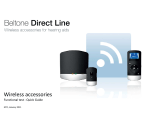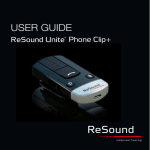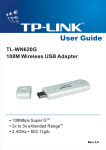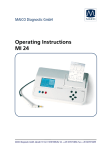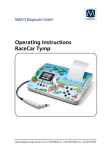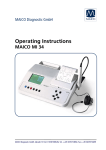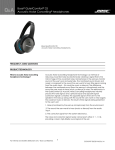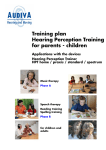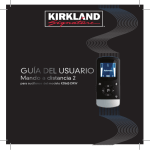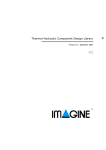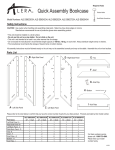Download ReSound Aventa 3 User Guide
Transcript
ReSound Aventa 3 User Guide Table of contents Introduction Introduction . . . . . . . . . . . . . . . . . . . . . . . . . . . . . . . . . . . . 3 ReSound Aventa® just got even better Installation . . . . . . . . . . . . . . . . . . . . . . . . . . . . . . . . . . . . . 4 Now truly wireless and with an optimized flow, ReSound Aventa® 3 takes professional fitting to a new level. Launching Aventa 3 . . . . . . . . . . . . . . . . . . . . . . . . . . . . . . 5 Fitting . . . . . . . . . . . . . . . . . . . . . . . . . . . . . . . . . . . . . . . . . 6 Main Screen Functionality . . . . . . . . . . . . . . . . . . . . . . . . . 11 Aventa 3 Screen Structure . . . . . . . . . . . . . . . . . . . . . . . . 13 Fundamental Features in Aventa 3 . . . . . . . . . . . . . . . . . . 14 Other Features and Functionality . . . . . . . . . . . . . . . . . . . . 19 General Precautions . . . . . . . . . . . . . . . . . . . . . . . . . . . . . 26 General Warnings . . . . . . . . . . . . . . . . . . . . . . . . . . . . . . . 26 Its intuitive interface and wide range of proven fitting tools have been specifically designed to deliver an even faster, more efficient and more comfortable fitting experience. ReSound Aventa® 3 is built on best practices from Aventa® 2 and the results of in-depth research with audiologists and hearing care professionals. Its improved functionality ensures an optimized flow for easier and more intuitive fitting. ReSound Aventa® 3 is your professional tool for every type of fitting – from the elementary to the highest level of sophistication. If you are not yet familiar with ReSound Aventa®, this is your chance to get started. The new fitting software is extremely easy to learn and use. Aventa 3 continues to use Audiogram+, ReSound’s proprietary fitting algorithm for setting target gains and frequency response recommendations. Other target rules include DSL i/o, NAL–NL1, NAL-NL2 and NAL - R/P can also be the basis for your fittings. Aventa 3 provides you with a user centered screen format with information and tools at your fingertips or just a mouse click away. • The Start Screen will as the screen states get you started. This is the screen where you set the client experience level and choose your fitting approach. Are you fitting with Airlink or Speedlink? Are you going through the conventional fitting process or is the fast and automatic AutoFit approach the right way to go with this specific client? This screen efficiently assists you and your client in fitting ReSound hearing instruments. • The Pre-Fit Screen provides you with all the relevant product information. In this screen you can get a complete product overview, review fitting ranges, acoustical data etc. Pre-Fit Screen is also where you reconfigure the hearing instrument(s) to the desired configuration best suitable for the client. Various counseling tools are also available in this screen. Based on the clients audiogram counseling tools can help you explain your client about hearing and hearing loss. • The Fit Screen provides you with all the tools you’ll need to fit, adjust, fine tune, and complete your fittings. The tools are set up to assist you with the most complex task in an easy and intuitive interface. User centered design methodology was utilized in conjunction with dispensers to customize the software to work the way you work with fitting tools designed by the practitioner. • The Summary Screen provides a final overview and completes your interaction with your clients. Customizable reports are available for you to print and for your clients to take home with them. This Aventa 3 User Guide walks through the Aventa 3 software and interface structure to insure you have the tools and information you need to assist you in creating the best fitting for your clients. 2 3 1. Close all applications that may be running, including NOAH. Installation Launching Aventa 3 Let’s get started at the NOAH ”Module Selection” screen where you double-click on the ”ReSound” folder to get access to ReSound’s fitting software. 2. Before you can install Aventa 3, you must have NOAH3 (3.x) installed. (unless you wish to only run Aventa 3 Standalone) 3. Insert ”Aventa 3 CD” and Aventa 3 will automatically start up the installation process. If this does not happen go the CD and click the ”Setup.exe” 1 4. Follow the on-screen instructions as prompted until Aventa 3 has been successfully installed. 2 1 2 1. Double-click the Aventa 3 icon to launch ReSound Aventa 3. The Aventa 3 fitting software supports all digital ReSound instruments built on the ReSound RangeTM chip. ReSound Alera are the first ReSound products built on this technology. 2. Double-click the Aventa 2.9 icon to launch ReSound Aventa 2.9. Aventa 2.9 continues to support all digital ReSound instruments launched up until the release of ReSound Alera. For more detailed installation instructions please find the Aventa 3 installation guide on the root of the Aventa 3 CD. There are multiple language versions availabel on the CD. 4 5 Wireless Fitting and Wired Fitting Fitting This fitting guide gives an overview of how to fit ReSound wireless hearing instruments with ReSound Aventa 3. The ReSound Aventa 3 fitting software supports all ReSound instruments built on the ReSound RangeTM chip. For wireless fittings, open and close the battery door of the hearing instrument(s). Once this is done, they will be in discovery mode for 30 seconds. Click “Connect” in the upper right corner of the Aventa 3 Start screen to start the wireless detection. The AirlinkTM will search for the hearing instrument(s). Getting Started Prior to connecting to ReSound instrument(s): • If fitting RIE instrument(s), attach the appropriate receiver for the client’s hearing loss to the hearing instrument(s). 1 • ReSound instruments fitted with Aventa 3 require a battery when fitting. Make sure the battery is fresh and that it is inserted correctly. 1. The search for instruments will last for 30 seconds. If the instrument(s) are detected while the search is ongoing, you may click the ’Stop’ button and proceed to assigning the instrument(s) • a) For wireless fittings, insert AirlinkTM in a USB slot on the fitting PC, or USB hub, and wait for the message that new hardware has been found. Then open Aventa 3. b) For wired fittings make sure that the programming interface (Speedlink, Hi-PRO or NOAHlink) is connected to the PC. • Launch Aventa 3. For new fittings, Aventa 3 begins in the Start screen, where the client’s experience with amplification can be selected, the programming interface can be chosen, and connection to hearing instrument(s) can be established. 2. Play a beep to identify right from left hearing instrument 3. Assign hearing instrument to right or left ear Connecting to the hearing instrument(s) Select the appropriate user experience level in the Patient information box. This will ensure the best starting gain settings for the client. 2 3 Choose the appropriate programming interface in the “Connect using” drop-down menu in the Aventa 3 Start screen. For wireless fittings, select AirlinkTM. For wired fittings, this will either be Speedlink, Hi-PRO or NOAHlink 1. Choose patient experience level When the hearing instrument(s) have been identified, they can be assigned to the right or left ear. Click the “beep” button to have the hearing instrument play a beep and facilitate assigning the right and left instruments correctly. When the instrument(s) have been assigned, click “Done” to proceed to the Fit Screen or click “Manage accessories” to pair ReSound UniteTM accessories to the hearing instrument(s). 2. Select programming interface 1 3. Click “Connect” 2 3 For wired fittings, connect the hearing instrument(s) to the Speedlink, HiPRO or NOAHlink with the programming cables needed. Click “Connect” in the upper right corner of the Aventa 3 Start Screen. When instrument(s) are detected, the user lands directly on to the Fit Screen. To pair accessories, click ’Unite Accessories’ in the left navigation of the Fit Screen. 6 7 ReSound UniteTM Accessory Management The functionality for managing accessories can be accessed both from the Start Screen and from the Fit Screen. In a new fitting, click the “Manage Accessories” button after the instrument(s) have been assigned. To manage accessories from the Fit Screen, click the ”Unite Accessories” button on the left-hand side. The same page will come up regardless of which way you access it. If you are changing receivers on a ReSound RIE instrument (e.g. NP to HP), it’s important to physically change to the correct receiver, and reconfigure the instrument to ensure the proper gain settings. Reconfiguring instruments occurs on the Pre-Fit Screen. In the middle of the screen there is a button called reconfigure. Click this button and follow the instructions to reconfigure instruments for power level and/or change it from open or closed to the opposite. To pair an accessory with the hearing instrument(s) click ”Add” and then follow the instructions on the screen that will put the accessory in pairing mode. Once the accessory is successfully paired, it is displayed with a graphic of the device and the ”Add” button changes to ”Remove”. 1. Click ”Unite Accessories” to open the accessory management window. 1 1. Click “Reconfigure” and follow the instructions 1 2 2. Click “Add” to pair accessory with hearing instrument 2. Select receiver size and open/closed configuration 2 3. Follow the on-screen instructions to put the accessory in pairing mode and pair to the hearing instrument(s) 3 3. Click ’Reconfigure’. 3 4. When finished click “Done” to return to the fitting 4 Once all the required accessories are paired with the hearing instrument(s) click ”Done” and continue with the fitting. 8 9 Programming Once the fitting is complete and all the necessary adjustments are made, click ”Save” at the bottom right of the Fit Screen. Once the data is saved to the instrument(s) and to the database (NOAH) there will be a confirmation sentence with a green check mark at the bottom of the screen. Main Screen Functionality Start Screen The Start Screen is the default screen for new clients when entering Aventa 3. Start Screen can be where you begin any new fitting regardless of whether the client is an experienced user or a client trying out hearing instruments for the first time. 1. Verify your patient data and choose the appropriate hearing instrument experience level 1 2. Select in the drop down the programming interface you wish to use and click ”Connect” to connect to the hearing instruments 2 3 1. Click “Save” to complete the fitting 3. Click ”Select Instrument” to go through the fitting steps without a psychical instrument(s) connected 1 At this time it is safe to disconnect the instrument(s). A second option at this time is to go to the Summary Screen. If any changes are made the confirmation will disappear and it will be necessary to re-save the data before disconnecting. Remember to reboot the instrument(s) before sending the patient home. Summary The Summary Screen allows the clinician to print information for the client, a third party, or clinic notes for a chart. Notes can be made and saved and printed as needed. Pre-Fit Screen The Pre-Fit Screen assists you when choosing hearing instruments, displaying fitting ranges and provides a view of the form factors in and out of the ear. You can retrieve all the information about the hearing instruments and options. 6 1 4 7 2. Write in session comments for this specific client. Comments are stored in NOAH 2 1 1. Click ”Reconfigure...” to reconfigure the hearing instruments into a different configuration. 2. Click ”Change instruments” to see all the available hearing instruments in Aventa 3. Select an instrument for the left and the right ear. 3 1. Click “Print” to customize fitting reports 4. AutoFit enables you to conduct fittings more directly than ever, without compromising accuracy. 4 3. Create a Hearing Loss Simulation for a 3rd party present during the fitting. 2 5 4. Click ”In-Situ Audiometry” to start In-Situ preparation. In-Situ Audiometry means that the dispenser uses the connected hearing instrument(s) to perform a hearing test rather than, or in addition to, using other audiometry equipment. 5. View the hearing instrument fitting range and use the counseling overlays to explain the clients hearing loss. 6. Use the ”Zoom” function to have a closer look at the hearing instrument and how it looks on the ear. 10 7. Enter speech scores and speech testing data. These data are used to re-calculate Natural 11 Directionality. 1. Calibrate DFS Fit Screen 2. Mute hearing instrument(s) With hearing instruments connected use the Fit Screen to make adjustment and fine-tuning. New hearing instruments are automatically fitted with recommended offsets based on audiogram and target rule. 3. Set up programs and environments to match your clients lifestyle and needs. Swap program around, compare program A/B, Autorelate and much more 4. Save your settings to the Hearing instruments and/or database (NOAH) 5. Under ”Tools” you’ll find all the various fitting tools to help you create the best possible fitting: * Gain Adjustment * Advanced Features * Physical Properties * Aventa Guide * Data Logging * Environmental Optimizer II * Beeps and Volume Control 1 2 7 3. Left-hand side navigation incl. Patient Information, Tools, Wireless and Feature Summary 3 6 8 4. Multi-media player including over 200 sound files. 4 9 1 6. Click anywhere under ”Wireless” to access the window where you manage the wireless connectivity and pairing of accessories. 1. Complete menu bar where you’ll find and access a large number of Aventa 3 functionality. 2. The Global Navigation takes you through the main Aventa screens always providing you with a clear indication of where you are in the fitting process 3 2 5 Aventa 3 Screen Structure 4 7. The fitting graphs display the target and response curves, and the shaded grey area represent full-on gain and SafeFitting 1 2 3 4 5 1 2 3 4 5 6 6 8. The gain matrix is where you can adjust gain and MPO. Use the up/down arrow to either increase or decrease the gain. Compression ratio is also displayed in the area. 9. Choose between gain increments of 1 dB, 2 dB or 3 dB. Summary Screen The Summary Screen provides a last look at the instruments and programs fitted. Here it is also possible to write fitting session comments for this specific client. 1. Confirm number of programs 2. Enter session comments 3. Click ”Print” to customize the Clinician Report and/or the Patient Handout slip. 1 4. Save to Hearing Instruments and/or database (NOAH) 5. Close and exit the fitting session 12 2 3 4 5 13 Fundamental Features in Aventa 3 This section is to describe the fundamental features in Aventa 3. The objective is to show the different sub-screens as well as frequently used features and control that are essential for the dispenser to do an efficient advanced fitting. Physical Properties To change vent or tube configurations, enter the ”Physical Properties” window. 1. Select Vent configuration 2. Select Tube size Gain Adjustment 3. Select Dome size 1. Gain Matrix 4. Copy to left or right side 1 4 2 2. dB increments 3 4 5. Set check mark to recalibrate DFS if Vent configuration is changed 5 3. Expand and collapse the gain handles 4. Unlink 1 5. Save 3 2 5 Aventa Guide Click ”Aventa Guide” to enter the questionnaire-based approach for fine-tuning. The Aventa Guide is ideally used at follow-up visits. Advanced Features To adjust or overview the feature pre-sets for the program operated, enter the ”Advanced Features” sub-screen. 1. Select a category of complaint 2. Select a problem 3. Select a solution 4. To carry out the solution, apply to Right, Left or Both Ears 1. Advanced Features Drop-downs 2. Unlink 2 1 2 5. Search function 3. Save 3 1 5 4 Alternatively you may search for a specific complaint by entering key words into the search function. 3 The Advanced Features sub-screen can also be accessed by clicking on the Features Summary 14 15 1. Programs and Environments Data Logging Beeps and Volume Control Click on ”Data Logging” to enter this sub-screen. 2. Volume over time To check beeps or volume control, click ”Beeps and Volume Control” to enter this window. 3. Volume per program 6 4. Volume per environment 1 1. Select Beep Frequency 2 5. Open Data Logging window automatically after reading hearing instruments 2. Standard Beeps 1 6. Reset 2 3 3. Wireless Beeps (only displayed for wireless products) 4 4. Volume Control (only displayed for products with a VC) 3 5 Environmental Optimizer II Environmental Optimizer II consists of an Environmental Fine-Tuner that enables easy adjustment in each of the listening environments. Both volume and noise reductions are available. Click on the slider thumb and move it to the desired position. 4 Program Tabs The program tabs in Aventa 3 are located below the fitting graph in Fit Screen. 1. Gain sliders for each of the 7 listening environment 2 2. Change to adjustment of Noise Reduction 1 To adjust noise reduction per environment, click the ”Adjust NoiseTracker II” button and the NoiseTracker II window will be displayed. 1. Noise Reduction sliders for each of the 7 listening environment 1 1. Click a program tab to display the various program options and select the desired environmental offsets. 1 2 2. Unlink 3. Click Save or Cancel 16 3 17 The Program Toolbar The Program Toolbar is where programs can be changed, added or removed. The program toolbar gives you program options with easy access: 1. Remove program 1 2 3 4 5 6 Other Features and Functionality Custom Target Rule To make your own personalized approach to prescribed gain, create your personal custom target rule. Access the ”Custom Target Rules” functionality by entering ”Fitting” in the menu bar. 2. Reorder program 3. Create Comparison program 4. Recalculate program 5. Autorelate program(s) 6. Copy to PhoneNow (function only active when in Acoustic Phone program) Once fine-tuning is complete you can copy the relative gain changes to any other program in your fitting. This can be done by clicking the “Autorelate” button in the tool bar beneath the program tabs. Gain adjustments can be autorelated to all or to selected programs. Select which programs to autorelate to by checking off the boxes. A program can be autorelated to any of the other programs. 1. Enter the name of you new custom target rule 1 2. Select reference rule 2 4 3 1. When having clicked ”Autorelate” choose which program you want to Autorelate from and which program(s) you want to Autorelate to. 2 3. Make the gain offset changes 4. Click ”Save” and Close the window 1 Restore Factory Settings In order to put an already programmed hearing instrument back to its original state from the factory use the ”Restore Factory Settings” tool 2. Choose whether you want to Autorelate to one hearing instrument or both the left and the right. 18 19 1. Select the instrument you want to restore. 2. Select the programming interface you want to use. You must have a wired connection. 1 Safe Fitting enabled 2 Safe Fitting disabled 3. Click ”Restore to Factory Settings” 3 Preferences In Aventa 3, the Preferences Menu includes four tabs: User Preferences, Machine Preferences, Clinic Info and Web Updates. 4. Click ”Close” when instrument has been successfully restored 4 Safe Fitting Once the DFS UltraTM is calibrated, the Fit screen automatically opens with two shaded grey areas visible on the graph (applied to most cases). The darker grey shaded area indicates unavailable gain while the light grey indicates added maximum stable gain provided by DFS UltraTM. If Safe Fitting is enabled, gain settings will be locked at the dark grey border. Safe Fitting can be turned off and on in the Fitting menu or set as a user preference. Note that if you have not calibrated DFS UltraTM, there will only be one shaded area which indicates the full-on gain of the particular hearing instrument(s). User Preferences are settings linked to the user account. Preference defaults changed here are changed specifically for the user/fitter using Aventa 3 when the Preference defaults are changed. The changes under User Preferences will only work for the single user account. All other user accounts will not be affected. Under ”User Preferences” you can: 1 1. Change your language default 2 2. Disable fitting and display functionality 3. Rearrange your preferred fitting flow 1. Gain Curves G[50] and G[80] 2. Maximum Stable Gain 3. Unavailable gain 3 3 2 1 4. Manual gain controls 4. To save your ”User Preferences” click ”Save” 4 4 20 21 Machine Preferences are settings/default that are linked to the specific PC where Aventa 3 is installed. Changes to a Machine Preference will be impact all user accounts, meaning that it will be applied to all fitting sessions conducted on this specific PC. Under ”Machine Preferences” you can: 1. Change a number of defaults for all user accounts for the PC 2. Change ReSound web site hyperlink 1 All information in the Clinician Report is optional and possible to remove or apply. 2 3. Enable or disable pin code or private label code 4. To save your ”Machine Preferences” click ”Save” Printed Reports For the dispenser the Clinician Report provides the technical information that are related to the session: - Fitting Information - Patient Information - Clinic information - Hearing Instrument Information - Programs 3 4 The ”Clinic Info” tab is part of the customized report building that can be done within the Aventa 3 print functionality. The information typed in here will automatically also be present in the printed reports. In the Web Updates tab you can disable the Web Updates functionality or adjust the update frequency. It is recommended not to disable this feature as there may be important update made available. 22 23 For the patient the Patient handout comprises customized, easy-to-understand information for the patient to bring home. The one-pager includes information on previous visit, instrument image(s), model names, serial numbers, plus brief description of the programs, batteries and tube size. To enter Print preview. To add or remove information to the Print Outs, click Edit your Printing preferences To change your preferences for printing, please click 24 25 General Precautions This ReSound fitting software will apply recommended amplification settings based on available audiometrical information. Settings will be specific to each fitting. Manual modification of the fitting parameters will impact and change the amplification level prescribed. This change will be audible to the patient when the instruments are connected. Caution should be exercised with patients sensitive to sounds, for example suffering from tinnitus or hyperacusis. General Warnings • When connected, the Aventa Fitting Software controls the acoustic amplification levels in a hearing instrument. In some acoustic environ ments, over-amplification can cause discomfort and injury to the patient. • The Fitting System provides initial default amplification settings based on hearing threshold levels. These default settings could be higher than stable levels and cause feedback when amplification is first applied. • The Fitting System initiates the feedback calibration procedure. Feedback calibration uses broadband noise to measure the amount of sound leaking from the hearing instrument. The output level is designed to be on the boarder of “uncomfortable” level based on hearing threshold level at a specific frequency. The sound will be ramped up in volume and cease when the calibration data is received. It is possible for the level to exceed a patients comfort level, but it needs to be determined if it can obtain hazardous risk levels. • The Fitting System uses feedback calibration measurements to compute Max Stable Gain values. These values are an estimate of the amount of gain that can be safely applied to a hearing instrument before it begins to cause feedback. There is a warning when this gain is reached, and the over-gain values are highlighted with bold, red text. The safety margins give a “close” approximation of the actual feedback border. However, it is an estimation and feedback can occur before the warning is given. Sustained feedback on high power devices can damage residual hearing. • Warning to hearing care practitioners Special care should be exercised in selecting and fitting hearing instrument(s) whose maximum sound pressure level exceeds 132 dB SPL with an IEC 60711: 1981 occluded ear simulator, because there may be a risk of impairing the remaining hearing of the hearing instrument user. • Warning to hearing care practitioners Special care should be exercised in selecting and fitting hearing instrument(s) utilizing Tinnitus Sound Generator. The maximum output of the tinnitus sound generator feature falls into the range that can cause hearing loss according to OSHA regulations. For further details please consult the user guide of the relevant Hearing Aid that includes the Tinnitus Sound Generator feature. The user should not use the sound generator for more than eight (8) hours a day when this is set below 90db SPL. Above that level, the device should not be used for more than two hours per day. In no case should the sound generator be worn at uncomfortable levels. Children and physically or mentally challenged users will require guardian supervision while wearing the device. • The Fitting System initiates feedback calibration to measure the receiver-to-microphone transfer function. This is used primarily by the hearing instrument to manage feedback suppression but it is also used to display the limits of stable gain. • The maximum stable gain estimates are based on feedback calibration data, the presence of active feedback suppression, and a headroom estimate. The headroom value is meant to be conservative however the presence of directionality has shown to give inaccurate estimates of max. stable gain. The risk is that, under some situations, The Fitting System could show that the hearing instrument is stable when it is actually close to unstable and in risk of feedback. • If feedback calibration has not been performed during fitting the Max Stable Gain is not known and the device could cause feedback without warning. • The Fitting System uses the Audiogram+ algorithm to interpret audiogram data for determining optimal gain settings. The parameter used is “first time user”. This may give a less than optimal initial fitting but should not pose a safety risk. The algorithm has been independently validated with the specification and verified to be consistent with Fitting Software 26 WARNING points out a situation that could lead to serious injuries. CAUTION indicates a situation that could lead to minor and moderate injuries 27 ReSound® provides excellent sound by offering innovative hearing solutions that combine original thinking and design with solid technology – all based on deep audiological insight and a profound understanding of users. 17461900-GB-11.03. Rev. B Now modernised and truly wireless, ReSound Aventa® 3 takes professional fitting to a new level. Its ultra intuitive interface and wide range of proven fitting tools have been specifically designed to deliver an even faster, more intuitive and comfortable fitting experience. Any issues relating to the EU Medical Device Directive 93/42/EEC should be directed to ReSound A/S Worldwide headquarters ReSound A/S Lautrupbjerg 7 DK-2750 Ballerup Denmark Tel.: +45 45 75 11 11 Fax: +45 45 75 11 19 www.resound.com United Kingdom GN ReSound Ltd. Kirtlington Business Centre Portway Kirtlington Oxon OX5 3JA Tel.: 0 1869 343 5000 Fax: 0 1869 343 466 www.resound.com Australia GN ReSound Pty. Ltd. Unit R1 Regents Park Estate Regent Park NSW 2143 Tel.: (free) 1800 658 955 Fax: 02 9743 7472 www.resound.com.au New Zealand GN ReSound (NZ) Ltd. 12 Parkway Drive Mairangi Bay Auckland Tel.: (free) 0800 900 126 Fax: (free) 0800 007 695 www.resound.com.nz Canada GN ReSound Canada 303 Super test Road Tronto, Ontario CANADA M3J 2M4 Tel.: +1 888 737 6863 Fax: +1 800 666 4089 [email protected] www.gnresound.ca ReSound® and rediscover hearing are registered trademarks of The GN ReSound Group, all rights reserved.















